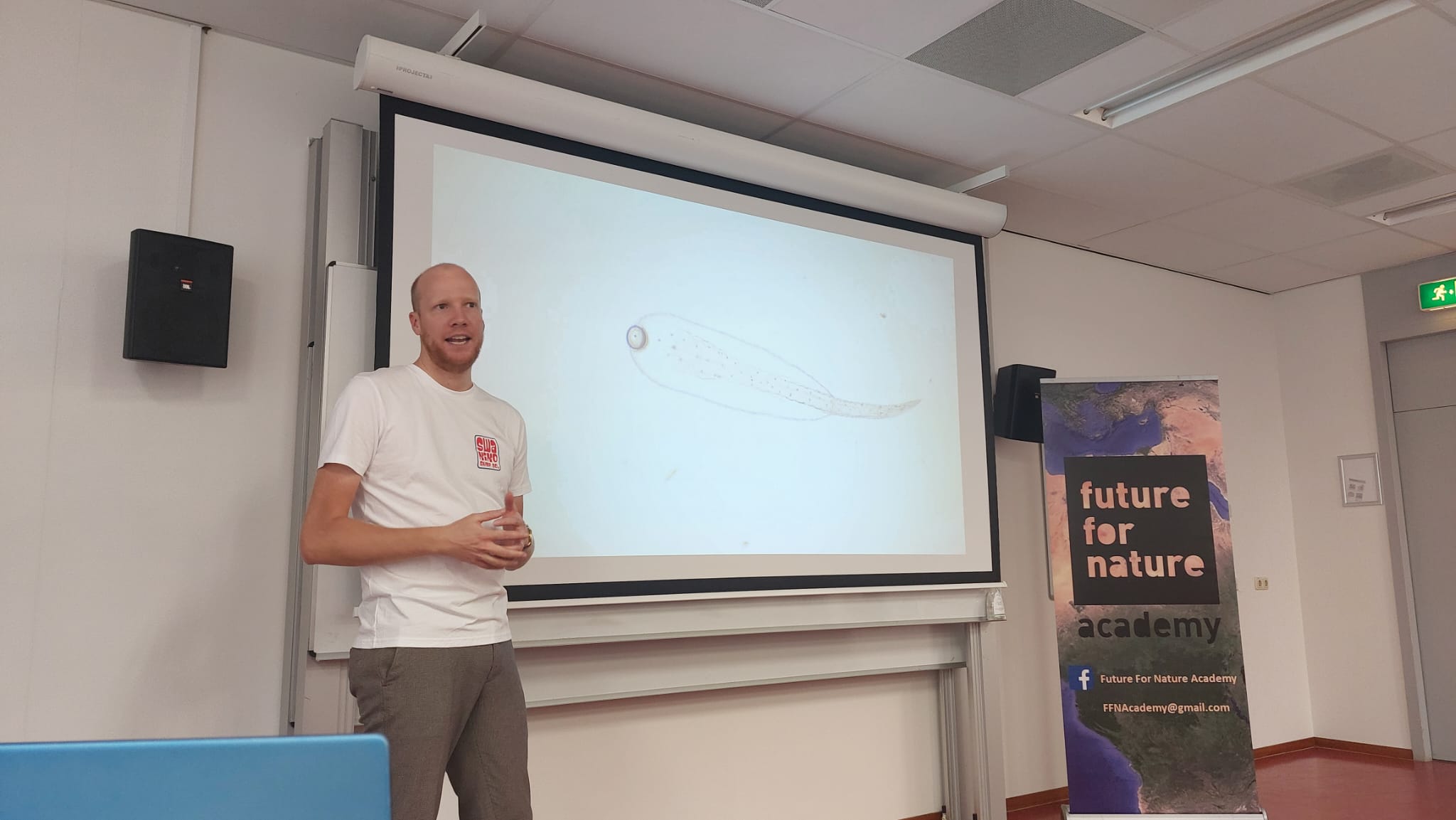HOW MARINE FISH ARE THE KEY TO CORAL RESOTORATION
Sander van Lopik, founder and field technician at RoffaReefs, will come and give a lecture on the importance of zoos in marine conservation!
This event has passed
Thursday, June 6, 2024
17:00-19:00
Den Bosch
HAS green academy, Room: 2A.12
Onderwijsboulevard 221, 5223 DE

Event Report
On June the 6ths Sander van Lopik came to HAS green academy to talk about his accomplishments and work on exploring the unknown reproduction of marine fish. Sander is an aquarist turned field technician, who worked at the largest unconnected reeftank at Burgers Zoo and at WWF to breed sharks and bring them back to the North Sea. Then he started working at Diergaarde Blijdorp with whom he collaborated with his own start-up to do his experiments. In 2021 Sander launched his start-up RoffaReefs with the aim to make a difference in the way breeding and feeding of marine fish is done, with the aim of creating healthy coral reefs. As a true ‘Willie Wortel’ (Gyro Gearloose), as his boss calls him, he invents a devices to help fish breeding.
Sander started his presentation with sharing a piece of information not many may know yet: we do not know how to breed marine fish in captivity. There is very little knowledge in general about marine fish reproduction, and thus we need to study this a lot more. However, most fish are pelagic spawners, which makes the research difficult. Sander encouraged us to take a close look at a coral reef, and really study the needs and wants of each individual. Once we know this, we can apply it to aquaria too. For reef heath a good balance in species composition is important. You can compare it to building a house; you need not just a house, but also the plumber to fix things.
RoffaReefs was started by Sander to learn more about marine fish breeding. In order to achieve this, Sander and his team created a floating solar-powered breeding system for use in open water. In this ‘eggspedition’ they caught fish eggs in plankton nets in the waters around Bonaire. The location and date of each egg was meticulously recorded, and then the eggs where extensively studied in the lab. In collaboration with TU Delft, special cameras where created to photograph the eggs while still alive and moving around. With help of AI they can identify the fish species out of approximately 300+ species around Bonaire. Then Sander showed some amazing pictures of fish eggs that he and his team took with the special cameras.
You sometimes first need to create something and make it practical before researching it, Sander explained. With RoffaReefs, the creation of the egg-capturing and breeding devices happened before science became part of it. Sander explained that science is not always the highest goal, but one of the tree pillars for conservation. The other pillars are the nature based solution, and the involvement of the local community. If you do not have these pillars, you also cannot do research.
Sander closed off with an awesome video of an larvae of a parrotfish hatching from an egg. Of course we gave Sander a big thank you and we ended with lots of questions from the audience. It was a wonderful and remarkable afternoon. We learned a lot new things about the amazing world of fish breeding and coral reef restoration!
By Jolinka Boer

About Event
Sander van Lopik is a field technician and the founder of RoffaReefs, a program founded and based in the Rotterdam Zoo, that aims to research and breed marine fishes to safeguard coral reefs. During his presentation he will talk about his background as an aquarist and how a zoo can be a living lab that is perfectly suited as an intermediate step for in situ conservation work.
In order to breed fish on the coral reef more information is needed on the reproduction of reef fish. Currently, there is a huge knowledge gap on the breeding and reproduction of marine fish. Global research efforts are tracking the spawning events of corals for conservation purposes, but information is scarce on the spawning events of marine fish. That is why RoffaReefs started an eggspedition in Bonaire, with the ultimate goal to restock reefs with corals and fish!







